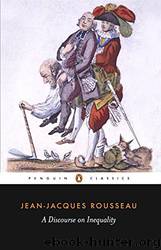A Discourse on Inequality by Jean-Jacques Rousseau Maurice Cranston (translator)

Author:Jean-Jacques Rousseau, Maurice Cranston (translator)
Language: eng
Format: epub
Publisher: Penguin Classics
Published: 1985-02-05T00:00:00+00:00
PART TWO
THE first man who, having enclosed a piece of land, thought of saying ‘This is mine’ and found people simple enough to believe him, was the true founder of civil society. How many crimes, wars, murders; how much misery and horror the human race would have been spared if someone had pulled up the stakes and filled in the ditch and cried out to his fellow men: ‘Beware of listening to this impostor. You are lost if you forget that the fruits of the earth belong to everyone and that the earth itself belongs to no one!’1 But it is highly probable that by this time things had reached a point beyond which they could not go on as they were; for the idea of property, depending on many prior ideas which could only have arisen in successive stages, was not formed all at once in the human mind.2 It was necessary for men to make much progress, to acquire much industry and knowledge, to transmit and increase it from age to age, before arriving at this final stage of the state of nature. Let us therefore look farther back, and try to review from a single perspective the slow succession of events and discoveries in their most natural order.
Man’s first feeling was that of his existence, his first concern was that of his preservation. The products of the earth furnished all the necessary aids; instinct prompted him to make use of them. While hunger and other appetites made him experience in turn different modes of existence, there was one appetite which urged him to perpetuate his own species: and this blind impulse, devoid of any sentiment of the heart, produced only a purely animal act. The need satisfied, the two sexes recognized each other no longer, and even the child meant nothing to the mother, as soon as he could do without her.
Such was the condition of nascent man; such was the life of an animal limited at first to mere sensation; and scarcely profiting from the gifts bestowed on him by nature, let alone was he dreaming of wresting anything from her. But difficulties soon presented themselves and man had to learn to overcome them. The height of trees, which prevented him from reaching their fruits; the competition of animals seeking to nourish themselves on the same fruits; the ferocity of animals who threatened his life – all this obliged man to apply himself to bodily exercises; he had to make himself agile, fleet of foot, and vigorous in combat. Natural weapons – branches of trees and stones – were soon found to be at hand. He learned to overcome the obstacles3 of nature, to fight when necessary against other animals, to struggle for his subsistence even against other men, or to indemnify himself for what he was forced to yield to the stronger.
To the extent that the human race spread, men’s difficulties multiplied with their numbers. Differences between soils, climates, and seasons would have forced men to adopt different ways of life.
Download
This site does not store any files on its server. We only index and link to content provided by other sites. Please contact the content providers to delete copyright contents if any and email us, we'll remove relevant links or contents immediately.
| Ancient & Classical | Arthurian Romance |
| Beat Generation | Feminist |
| Gothic & Romantic | LGBT |
| Medieval | Modern |
| Modernism | Postmodernism |
| Renaissance | Shakespeare |
| Surrealism | Victorian |
4 3 2 1: A Novel by Paul Auster(12393)
The handmaid's tale by Margaret Atwood(7767)
Giovanni's Room by James Baldwin(7347)
Asking the Right Questions: A Guide to Critical Thinking by M. Neil Browne & Stuart M. Keeley(5776)
Big Magic: Creative Living Beyond Fear by Elizabeth Gilbert(5775)
Ego Is the Enemy by Ryan Holiday(5451)
The Body: A Guide for Occupants by Bill Bryson(5098)
On Writing A Memoir of the Craft by Stephen King(4945)
Ken Follett - World without end by Ken Follett(4734)
Adulting by Kelly Williams Brown(4576)
Bluets by Maggie Nelson(4559)
Eat That Frog! by Brian Tracy(4542)
Guilty Pleasures by Laurell K Hamilton(4450)
The Poetry of Pablo Neruda by Pablo Neruda(4110)
Alive: The Story of the Andes Survivors by Piers Paul Read(4033)
White Noise - A Novel by Don DeLillo(4012)
Fingerprints of the Gods by Graham Hancock(4005)
The Book of Joy by Dalai Lama(3987)
The Bookshop by Penelope Fitzgerald(3854)
